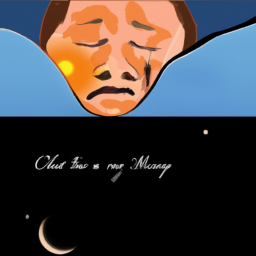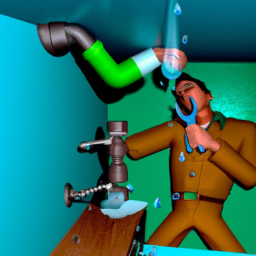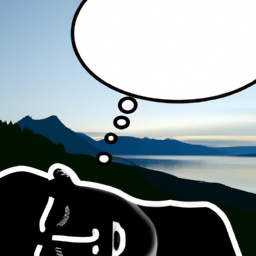I often find myself waking up with tears on my face, feeling emotionally drained from crying in my dreams. This strange and unsettling experience leaves me wondering why my subconscious is subjecting me to such distress. While it’s not uncommon, it can still be confusing and distressing for those who go through it.
In this article, I will explore why we cry in our dreams, what it means, and how to address any underlying emotional issues that may be causing this to happen.
Dreams are a mysterious and fascinating aspect of our subconscious mind, and crying in them can be a sign of deeper emotional turmoil. As someone who has experienced this firsthand, I have been curious to understand the reasons behind this.
In this article, I will delve into the relationship between dreams and our subconscious mind, as well as exploring the links between crying in dreams and stress or anxiety. By understanding these connections, we can begin to address any underlying issues and work towards a more peaceful sleep experience.
Key Takeaways
- Crying in dreams is a manifestation of stress and anxiety.
- Dreams can reveal unresolved emotional issues and other problems.
- Addressing underlying emotional issues is crucial to reducing stress and anxiety.
- Seeking the help of a therapist or counselor and practicing mindfulness, exercise, and relaxation can help improve emotional well-being.
Understanding the Phenomenon of Crying in Dreams
Have you ever woken up crying from a dream and wondered why it felt so real? Well, it turns out that crying in dreams is actually a common phenomenon that many people experience.
Our dreams are often a reflection of our emotions and subconscious thoughts, so it’s not surprising that we might cry in them. However, the reasons why we cry in our dreams can vary.
Sometimes we may be experiencing intense emotions during the dream that carry over into our waking state, such as grief, anxiety, or fear. Other times, our dreams may be processing unresolved issues from our past or present, and crying may be a way for our subconscious to release pent-up emotions.
Understanding the relationship between dreams and our subconscious mind can help us better understand why we cry in our dreams and how it may be connected to our emotional well-being.
The Relationship between Dreams and Our Subconscious Mind
You can gain insight into your deepest thoughts and feelings by exploring the connection between your dreams and your subconscious mind.
Dreams are often a manifestation of our innermost desires, fears, and worries. They provide a window into our subconscious mind, which is constantly working to process our emotions and experiences.
When we dream, our subconscious mind is free to express itself without the filter of our conscious thoughts. This is why dreams can sometimes be very vivid and emotional, causing us to cry or wake up in tears.
The link between crying in dreams and stress/anxiety is a complex one, and exploring this connection can help us better understand and manage our emotions in waking life.
The Link between Crying in Dreams and Stress/Anxiety
It’s amazing how our subconscious mind can reveal our deepest stress and anxiety through the emotions we feel in our dreams. One particular emotion that stands out is crying. I have personally experienced waking up in tears after a dream that left me feeling emotionally drained. It’s not uncommon to dream about stressful or anxiety-inducing situations, and crying in the dream can be a way for our subconscious to release those pent-up emotions.
According to a study by the Sleep Science and Practice Journal, crying in dreams is often associated with feelings of sadness, fear, and helplessness. These emotions are commonly linked to stress and anxiety, which can carry over into our dreams. To further understand the link between crying in dreams and stress/anxiety, I’ve created a table outlining some common stressors and the emotions they can evoke in our dreams.
| Stressor | Emotions in Dreams |
|---|---|
| Work | Anxiety, fear, frustration |
| Relationship issues | Sadness, fear, anger |
| Health concerns | Fear, helplessness, sadness |
Addressing underlying emotional issues is crucial in reducing stress and anxiety levels, which can ultimately lead to a better night’s sleep and fewer tears in our dreams.
Addressing Underlying Emotional Issues
By acknowledging and addressing your underlying emotional issues, you can potentially reduce the likelihood of experiencing intense emotions in your dreams.
It’s important to understand that our dreams often reflect our subconscious thoughts and emotions. Therefore, if you’re experiencing frequent dreams where you’re crying or feeling intense emotions, it may be an indication that there are unresolved emotional issues that need to be addressed.
To start addressing these issues, it may be helpful to speak with a therapist or counselor. They can help you identify any underlying emotions that may be causing you distress and provide you with tools and techniques to better cope with them.
Additionally, practicing self-care techniques such as mindfulness, exercise, and relaxation can also help reduce stress and anxiety, which may, in turn, lessen the intensity of emotions in your dreams.
Remember, taking care of your emotional well-being is important for overall health and happiness.
Frequently Asked Questions
Is crying in dreams a sign of mental illness?
No, crying in dreams is not a sign of mental illness. It’s a normal human experience. However, it can be emotionally intense and leave an impression on our waking life, making us feel sad or anxious.
Can crying in dreams be a symptom of a physical health issue?
Crying in dreams can be a symptom of physical health issues such as sleep apnea, anxiety, or depression. It’s important to discuss with a healthcare provider to determine the underlying cause.
Can medication affect crying in dreams?
Yes, medication can affect crying in dreams. Personally, I’ve noticed that certain medications have caused me to have more vivid dreams that sometimes result in emotional reactions like crying upon waking up.
Can crying in dreams be a result of trauma?
Yes, crying in dreams can be a result of trauma. Traumatic experiences can cause emotional distress that can manifest in dreams. It’s important to seek support from a therapist to process and heal from traumatic experiences.
Can lucid dreaming help control crying in dreams?
Lucid dreaming allows me to control my emotions in dreams, including tears. I use symbolic imagery to release and process my feelings. It’s like being the director of my own movie, bringing healing and empowerment.
Conclusion
In conclusion, I’ve learned that crying in dreams is closely linked to our subconscious mind and emotional state. It can be a manifestation of stress, anxiety, or unresolved emotional issues. While it can be unsettling and confusing upon waking up, it’s important to address the underlying emotional issues that may be causing these dreams.
Like a river flowing freely, our subconscious mind can bring to the surface emotions that we may not be fully aware of. Crying in dreams may be a way for our mind to release these emotions. By acknowledging and addressing these emotions, we can move towards a healthier emotional state and ultimately lead a more fulfilling life.
So, the next time I wake up crying from a dream, I’ll take it as a sign that there may be something deeper to explore within myself.










